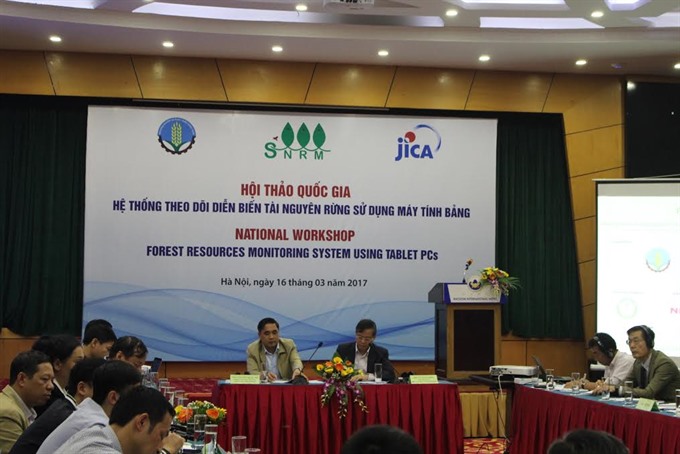 Society
Society

Tablet-based forest monitoring does not only improve the quality of collected data, but also makes the process of data collection and reporting easier for users compared with the current paper-based methods.
 |
| Participants attend a workshop held in Hà Nội on Thursday aimed at sharing experiences in applying innovative forest monitoring methods and exploring ways for its nationwide replication. – VNS Photo |
HÀ NỘI — Tablet-based forest monitoring does not only improve the quality of collected data, but also makes the process of data collection and reporting easier for users compared with the current paper-based methods.
Nguyễn Quốc Trị, deputy head of the Việt Nam Administration of Forestry (VNFOREST), said this at a workshop held in Hà Nội on Thursday, aimed at sharing experiences in applying the innovative forest monitoring method and exploring ways for its replication nationwide.
The workshop was organised by Japan International Cooperation Agency (JICA) and the Việt Nam Administration of Forestry.
Tablet-based forest monitoring was innovative, and provides a cost-effective, time-saving and easy-to-navigate method of forest resource monitoring through the use of tablet PCs and an associated Android-based application, Trị said.
As Điện Biên Province is one of the localities participating in the project, Phạm Văn Khiên, deputy head of the province’s ranger sub-department, said this method proved to be efficient, accurate and cost-effective.
"When there is any impact on the forests such as deforestation, forest fires or encroachment of forest land, forest owners and relevant agencies can calculate the damage through digital data transfer," he said.
Khiên said that tablet-based forest monitoring attracted the attention of many forest rangers and forest owners in the province.
Suzuki Kei, the consultant for the Sustainable Natural Resource Management (SNRM) project, said the use of tablet PCs will improve accuracy in calculating changes in forest coverage through GPS, reducing mistakes by reporting through digital forms, and removing inefficiencies in data management through digital data transfer and a centrally-controlled server.
“Improved forest monitoring is among important prerequisites for better forest management. It could also promote the engagement of local communities through activities like village-based forest patrolling,” he said.
The robust and transparent forest monitoring system was among the requirements for Việt Nam to receive the REDD+ result-based payments (RBPs) under an international climate change agreement, he said.
REDD+ involves countries’ efforts to reduce emissions from deforestation and forest degradation, and foster conservation, sustainable management of forests, and enhancement of forest carbon stocks.
The Sustainable Natural Resource Management project is a bilateral technical co-operation project funded by the Japanese International Co-operation Agency which lasts from August 2015 to August 2020.
The total budget of the project amounts to US$12.1 million. Of this, $10.3 million came from the Japanese Government and the rest from a Vietnamese counterpart.
The project has four major components; namely forest policy, sustainable forest management, biodiversity conservation, and knowledge sharing. — VNS




